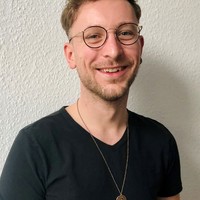- Research associate in Social and Cultural Anthropology (Freie Universität Berlin), interested in the fields of medica... moreResearch associate in Social and Cultural Anthropology (Freie Universität Berlin), interested in the fields of medical anthropology, queer studies, and science and technology studies. Currently, I'm developing my PhD project about the co-constitution of biotechnologies and queer intimacies.edit
- Hansjörg Dilgeredit
This blog post presents a speculative engagement with the new roads taken by the “friends of Dorothy” in post-Tornado Berlin – and the anthropologist upon their ruby slipper heels. More precisely, I ask how gay men have sex and engage... more
This blog post presents a speculative engagement with the new roads taken by the “friends of Dorothy” in post-Tornado Berlin – and the anthropologist upon their ruby slipper heels. More precisely, I ask how gay men have sex and engage intimately, and which spaces of queer intimacy are emerging along their quest for habitable presents and futures. Which pathways will and could anthropology take in these disturbing times and will the yellow brick road lead us back to where we started, to the familial home in Kansas?
Research Interests:
How can we conceptualize medicine, health, and healing in ever-changing economic, legal, technological, and political constellations? How do material and institutional, but also affective and emotional, dimensions of health-related... more
How can we conceptualize medicine, health, and healing in ever-changing economic, legal, technological, and political constellations? How do material and institutional, but also affective and emotional, dimensions of health-related practices, socialities, identities, experiences, and objects intersect at different scales, from the local and national to the transnational and global? How are these processes embodied, also with regard to different temporalities? The introduction of ‘transfigurations’, a concept that has so far not been used in medical anthropology, was intended to stimulate discussions about these questions. Both the concept and the conference around which it was based sparked processes of thinking through the emergence of radically new constellations with regard to both their human and nonhuman elements, as well as their partially contradictory, often elusive relations to each other.
Research Interests:
Der vorliegende Beitrag befasst sich mit Chemie, Körpern und Stadt in ihren intimen Verstrickungen und wechselseitigen Beeinflussungen. Er untersucht, wie sich die Stadt mittels Chemie auf verschiedene Weise in Körper einschreibt und... more
Der vorliegende Beitrag befasst sich mit Chemie, Körpern und Stadt in ihren intimen Verstrickungen und wechselseitigen Beeinflussungen. Er untersucht, wie sich die Stadt mittels Chemie auf verschiedene Weise in Körper einschreibt und gleichzeitig das Städtische in chemisch vermittelten Körperpraktiken ständig neu produziert wird. Ausgehend von einer ethnographischen Forschung in einem höherpreisigen Friseursalon in Berlin schlage ich vor, die intentionale und lustvolle Nutzung chemischer Substanzen mit ihren zugehörigkeitsstiftenden Effekten in den Blick zu nehmen. Urbane Zugehörigkeit wird dabei nicht als abgeschlossener Zustand verstanden, sondern als Fluchtpunkt, den einige Berliner*innen in sich überschneidenden Anwendungsformen von Schönheitsprodukten, Drogen und Pharmazeutika anstreben. Das Konzept des „Chemisch-Werdens“ begreift dabei spezifische Lokalitäten in Berlin, Körper in ihren intimen Beziehungen und Imaginationen des Städtischen als ein beständiges Wechselverhältnis. Ich stelle diese materiellen und affektiven Ko-Transformationen ethnographisch anhand von zwei Momenten des „Chemisch-Werdens“ vor: der Herstellung erstens von Looks mithilfe von Schönheitsprodukten im Salon und zweitens von Lust unter Zuhilfenahme von Drogen und der pharmazeutischen HIV-Prophylaxe PrEP in der (schwulen) Klubszene. In diesen Praktiken manifestiert sich urbane Zugehörigkeit nicht zwangsläufig in einer geteilten Identität oder festen Subkultur, sondern erscheint als affektives Zugewandt-Sein und materiell-körperliches Streben-nach.
Research Interests: Queer Studies, Anthropology of the Body, Urban Anthropology, Sexuality, HIV/AIDS, and 12 moreGay And Lesbian Studies, LGBT Issues, Urban Studies, STS (Anthropology), Sociology of the Body, Affect (Cultural Theory), Berlin, Drugs, Substance use and abuse, Beauty and Health, Disco queer dance club culture, and Queer Anthropology
Sex and sexuality have been approached in anthropology either as a topic of investigation or as a methodological concern, in the latter case, with regard to the anthropologist’s own sexual or romantic involvements in the field. Based on... more
Sex and sexuality have been approached in anthropology either as a topic of investigation or as a methodological concern, in the latter case, with regard to the anthropologist’s own sexual or romantic involvements in the field. Based on ethnographic fieldwork at an upmarket hairdressing salon in Berlin, this article troubles this compartmentalized framing. The hairdressers’ way of introducing sexual ambiguity to social situations suggests a notion of sexuality beyond identity, community or practice. Sexuality as world-making disorients the anthropological project of sense-making through the gesture of the wink. Drawing on the gay archive of camp, a style of exaggeration, ridicule and artificiality, this article highlights the productive moments of such disorientations that can inform a queer sensibility in anthropology. This calls for bodily and affective indulgences in the field and invites ambiguous performativity into the ethnographic text in order to enrich anthropology’s take on sex and sexuality.
Research Interests:
Report on the Workshop “Exploring Ecologies of Mind in (Mental) Health: Eco Pathologies and Onto-Politics of Healing Economies” by the Working Group Medical Anthropology within the German Anthropological Association (DGSKA), May 16–17,... more
Report on the Workshop “Exploring Ecologies of Mind in (Mental) Health: Eco Pathologies and Onto-Politics of Healing Economies” by the Working Group Medical Anthropology within the German Anthropological Association (DGSKA), May 16–17, 2019, FU Berlin
Research Interests:
Queer Companions tells the life stories of Baba, Amma, Zaheda, Murad and his former disciple Dost, as well as the rivals Jamal and Bibi – the fakir figures who guide the reader through the material and affective geography of Sehwan. In... more
Queer Companions tells the life stories of Baba, Amma, Zaheda, Murad and his former disciple Dost, as well as the rivals Jamal and Bibi – the fakir figures who guide the reader through the material and affective geography of Sehwan. In their company, we learn how forming intimate attachments with saints profoundly transforms worlds, as fakirs leave behind roles and positions ascribed to them by society.
